It’s the dawn
Of a new day
In an old era
In the same old way.
It’s the cycle renewed
Again and again without end
A ceaseless iteration
Of nation against nation
Of despair strangling hope
Shoots of hatred
Tendrils of fear
A choking underbrush
Infesting our gardens of Eden
Who was it said
We must kill, and kill, and kill
Until all are dead
Who would become invasive species?
Whose god roared that battle cry
Under the glaring sun
Denying even the possibility
of innocence
Declaring even the unborn
‘Enemies of our state’
Infected with murderous intent?
Vermin only fit to hate?
Bloodlines.
Worm like veins
Through our sacred soils
Rooting the detritus
That defines us.
Ancient scrolls
And chiseled texts
Implacable as tombstones.
Craig Spence,
August 18, 2024
Category: Religion
Off Leash Zone
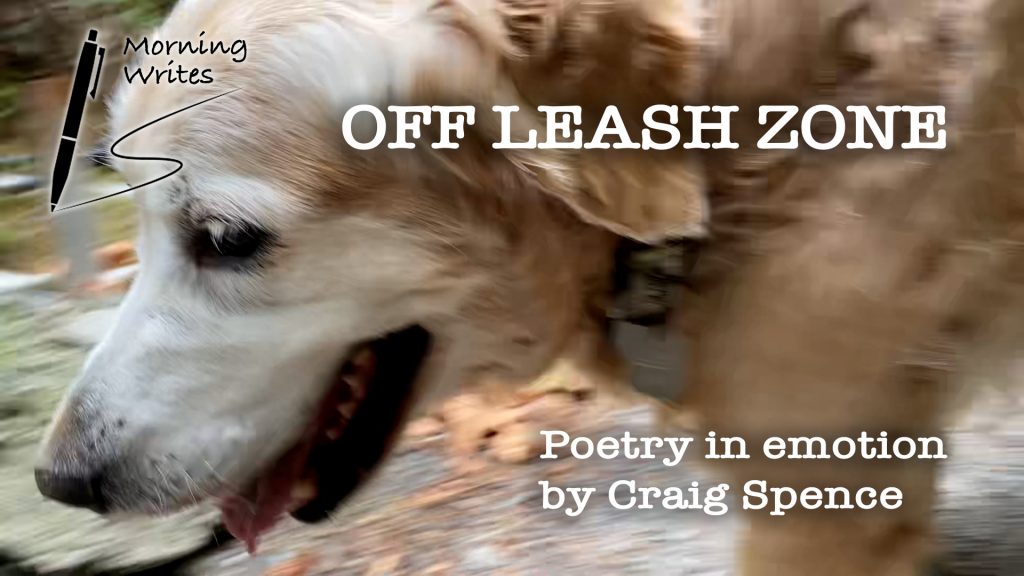
OFF LEASH ZONE
Lead on! Lead on!
my old, best friend,
beyond the very end
of this leash we both
are tethered to.
Lead on! Lead on!
Even though we do not know,
and dare not say,
exactly where we’re going…
Even though there is no point
within the compass of our ancient souls
to suggest one way or another—
no brilliant star, no station of the sun
for us to fix upon.
Whichever way we face,
that becomes the direction of our knowing.
And yet you pant, and strain,
and snuffle, and sniff,
as if there were some secret
(just around the bend
or crouching under some bush)
that makes sense of it all.
Lead on! Lead on!
Beyond the very edge
of this—our flattened earth—
and be assured, for what it’s worth,
that I must surely follow,
and you are not alone.
Craig Spence
CraigSpenceWriter.ca
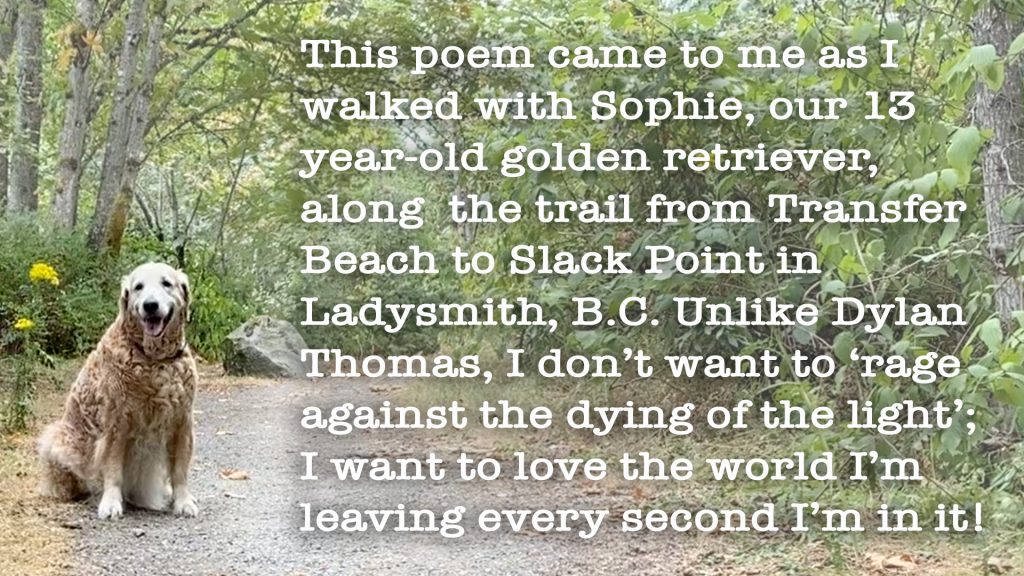
Death is not an event; it’s a process
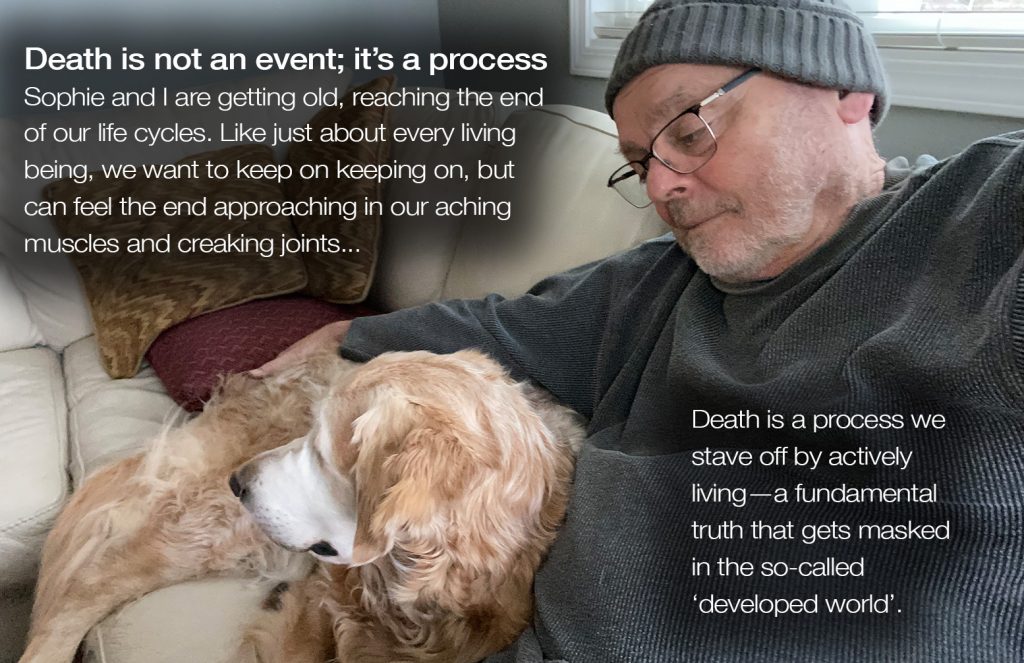
We tend to think of death as a sudden event—the moment we transition from life into… its opposite. In truth, death is a process we stave off every day by living. Which makes life an activity, not a state of being.
If I don’t hunt and eat, I die. If I don’t procreate, my future generations will never be. If I don’t mind my step, I will be killed by a car. Every day we must actively live, or we are likely to meet an untimely end. I must exercise and manage my diet, or my ability to live is compromised—and so it goes.
Death is part of the process of renewal. I, as an individual, make my contribution, then give way as new ideas and modes of living are born. Whole civilizations become artifacts and ultimately particles of dust in the inexhorable cycle of life. Worlds come into and pass out of being.
This perpetual struggle to survive is masked in the comfortable environments of the ‘developed world’. We don’t connect the need to work with the ongoing battle for survival. Ultimately, though, that robs our lives of meaning. We are here to give what we can, while we can.
Life is the convergence of energy, matter, and spirit in conscious, willing being. To me, the best possible life is devoted to bringing joy into the world—as much joy with as much grace as I can muster in my brief span.
The Speed of Light
Surely there’s enough room in the universe for everyone who has died.
That’s a relief, I suppose. It means there might… just might… be a heaven out there, even a god, who only need occupy a tiny corner of the 13 billion light year breadth of measured space and time… and who knows what lies beyond the known, how far we’d have to travel in our transcendental spaceships to reach the ever expanding membrane of infinity.
Language can say things it’s impossible to comprehend. Thirteen billion light years, for example. Uncle Franklin tried to describe the speed of light for me once. “If I flicked on a light switch, here in Chemainus, say at the tip of Bare Point, you’d see the beam – it’s a wave, actually, but for the sake of argument, let’s say you’d see that beam in just over a second, if you were standing on the moon, say in the Sea of Tranquility… one-point-two-five-five seconds to be exact, that’s how long it would take.”
Uncky Frank couldn’t have understood that most nine year olds wouldn’t have a clue what the heck he was talking about, of course. Or what the speed of light had to do with my father’s coffin, making its slow progress down the centre aisle of our church, borne on the shoulders of six strong friends and relatives. He was just trying to describe, after the fact, the theoretical speed a soul could fly according to his own theory of special relativity.
Mum and Dad used to laugh at Uncky Frank and his ‘weirdo theories’. “He should leave the science to Einstein, and stick to building houses,” Dad said. “He’s good at that.”
“His inquiring mind takes him to strange places,” Mum agreed, as if Uncky Frank’s brain was a poorly trained Pitt bull yanking him around on its leash.
They loved him, though. He was everybody’s favourite uncle.
“Your dad isn’t very far away, once you know ‘C’,” he said, sitting beside me at the wake. “That’s the constant that stands for the speed of light in a vacuum,” he added, when I gave him a puzzled, pleading look. “Three hundred thousand kilometres per second.” He smiled benignly.
“How far is it from your head to your heart?” he persisted. “Show me.” I put my left hand over my heart; my right on top of my head. “That’s how far away your dad is from you, always,” Uncle Franklin said. “He’ll never leave, and – at the speed of light – he’ll be with you in an instant, whenever you need him.”
Uncky Frank had a complete set of the Encyclopedia Britannica, on a special shelf next to his favourite armchair. He’d read it every evening, as if it was the world’s longest novel, from A to Z with occasional side-steps to look up an incomprehensible word in another article, then another word in the explanatory article, and another, and another, and so on.
“Unless someone’s reading it, these are just lumps of masticated wood, glue and fake leather, gathering dust,” he told me once. “Knowledge doesn’t reside in books. Squiggles on a page don’t mean anything until someone reads them.”
To his dying day Uncky Frank claimed to be an atheist. I visited him near the end. Gaunt, pallid, and weak as he was, he still smiled and gazed at me with his pale blue eyes. He could tell what I was thinking, and put his left hand over his heart; his right on top of his head. “That’s how far away from you I’ll be, if you ever need me,” he said.
I tried not to show it, but he laughed. “Just cause I’m what you call an atheist, doesn’t mean I don’t believe something. A few more days, and I’ll be gone, but I’ll live on in your memory,” he smiled benignly.
“And when I die?”
“You’ll live on in the memories of your friends, your colleagues, your family. And I’ll be a smidgen of that, which is enough for me.”
Uncky Frank bequeathed me his set Encyclopedia Britannica. I browse them from time to time, but there’s no reference to any history of mine in there, just antecedents. The speed of light hasn’t changed, though, and the time it takes a beam to get from Bare Point to the Sea of Tranquility on the moon.
End Note:
Writing is rarely a linear process. For example, this video has a typical pedigree. Yesterday I was working on Episode 43 of The Mural Gazer. In this scene Buddy paddles out onto Cowichan Lake, teetering on the brink of suicide. There, he encounters the spirit of Hong Hing, the Chinese merchant, bootlegger and gambling den operator, depicted in Chemainus Mural #4, who is tying to dissuade him. Although he’s alive and talking, Hong Hing is decked out as a deceased, oriental patriarch, and he’s floating to the forever-after on the mirror-calm surface of the moonlit lake.
I’m on aqua incognito for this description, so I started researching Chinese funerary traditions online, a fascinating glimpse into the rites of an ancient culture.
At the same time, I have been trying to get my head around Immanuel Kant’s metaphysical theory of Transcendental Ideals. Although that’s not the kind of subject matter you can throw undiluted into a novel, as a thematic undercurrent, I believe speculative philosophy enriches stories. And the rites I was learning about the Chinese belief in an afterlife, particularly the burning of Joss Paper and representations of things the deceased need to be happy in their new world, evoked by association Kantian proofs of god, heaven and immortality.
There’s no logic to the sequence that lead to The Speed of Light, but its origins do trace back to The Mural Gazer.
Fundamentals of Being
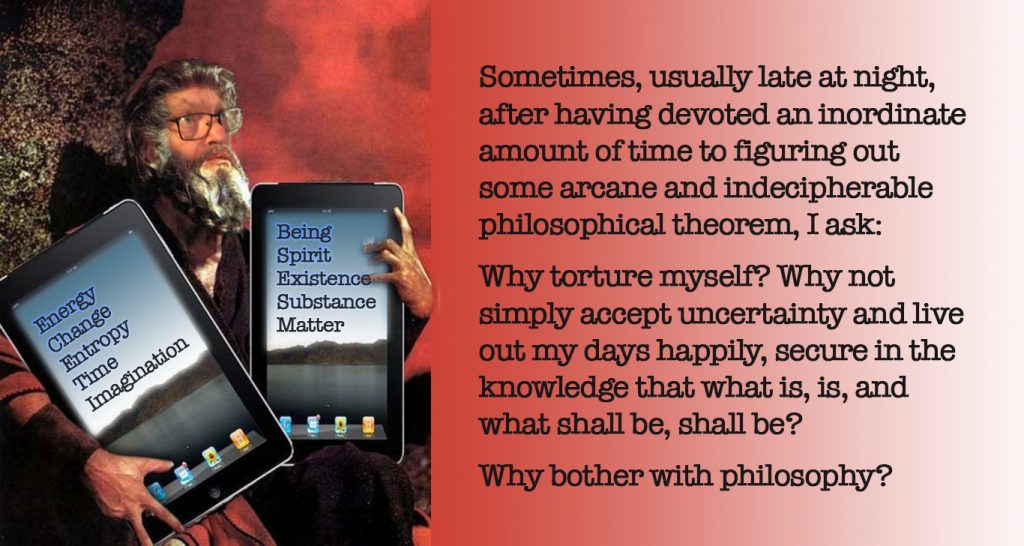
Sometimes, usually late at night, after having devoted an inordinate amount of time to figuring out some arcane and indecipherable philosophical theorem, I ask, “Why torture myself? Why not simply accept uncertainty and live out my days happily, secure in the knowledge that what is, is, and what shall be, shall be?”
Why bother with philosophy?
Recently, an answer to that question emerged. As mentioned previously here, for some weeks I have been muddling through Anthony Kenny’s A New History of Western Philosophy. Having just finished the lengthy section on Medieval Scholasticism, I considered myself not much the wiser for it. On the contrary, I felt disheartened and depressed.
That night, however, a list of conditions that I consider foundational to my own philosophy took shape, one after the other, in my mind. Even as I tapped them into my mobile – which I keep handy on the night table for recording thoughts – I realized these fundamentals were in response to my reading of the Medieval scholars… that they are part of my attempt to make sense of what my intellectual forebears had to say.
Here are the foundational statements to my own metaphysics:
- Substance is neither created nor destroyed.
- Change is incessant and never ending
- All change is transformation of one substance into another
- There are three fundamental substances: energy, matter & spirit.
- Nothing exists that is not composed of the three fundamental substances.
- The three fundamental substances never exist in isolation from one another.
- The purpose of Being is Being.
- The purpose of existence is existence.
- The purpose of change is change
- The nature of spirit is Being.
- The nature of matter is existence.
- The nature of energy is change.
- Entropy is countered by Being
- Being is threatened by entropy.
- Nothing cannot exist.
- This moment has been possible for all eternity.
- All future moments are possible in this instant.
- I can imagine that which does not exist; I cannot imagine that which is impossible.
- What I imagine does exist.
- I can only know what exists in imagination.
Not everyone will agree with that starting point. Perhaps no-one other than I will. And I may have to revise its terms as I go. But for this existentialist, at this moment, every one of those statements is true, none of them are conditional or contingent.
The end and beginning of belief

When I was a kid, my parents insisted I go to church. My older sister and brothers didn’t have to put on a scratchy suit and sit in the bum-polished pews of Norwood United for an hour or so of tepid religion – either because they were already saved or irredeemable, I didn’t know which. But I had no choice.
Then, at some point, Mum and Dad stopped attending, but insisted I continue to make my weekly pilgrimage to the House of God. I resented this arrangement, felt like a sacrificial lamb, being sent as a proxy to atone for my family’s guilt. The only redeeming factor in the whole situation was Rev. Kennedy’s daughter, who sat in the front pew, revering her father, while I sat toward the back, revering her.
Eventually, having recognized my own apostasy and the unattainable nature of the reverend’s daughter, I stopped going to church, too, saving the offertory money for other entertainments that might or might not have required forgiveness, but certainly had nothing to do with salvation.
Thus I spiralled like a misguided spark down the black hole of disbelief. I didn’t permit myself to know it at the time, but I’d stumbled upon my own sort of absolution at the drained font of atheism. It took decades for me to realize I was an atheist, decades more to believe it. I suppose it was mostly the unsettling notion of personal mortality that kept me in suspended animation all those years.
Having lived long enough to know that I don’t want to live forever, though, I’ve freed myself from that more or less selfish entanglement for imposing God on the universe. And what other reason could there be?
Well, it turns out that belief sort of sneaks up on you. If there is no God, I found myself asking, how do I explain all this? ‘All this’ referring to a seemingly infinite and eternal universe which harbours that most astonishing of all miracles: living Beings? Entities that are conscious, that procreate, and that have evolved into something as complex and incomprehensible as my self?
If you are not awed by the panoply of life buzzing, rooting, galloping, creeping, wriggling and a thousand other …ingings all around you, and inside you, and before you, and after… if you aren’t amazed, utterly and profoundly amazed by every bug on every leaf on every tree in the forest, then you can’t be fully human, can you?
That’s where religion sneaks back in. Aren’t awe, wonder and other such terms clearly in the religious realm? Don’t you have to be certifiably religious to use that kind of language in public? Doesn’t it bespeak things we mere mortals can’t understand, or even appreciate wholly. And if we can’t comprehend this universe of ours, who can? I mean someone has to? Otherwise, just like a bunch of passengers on a jumbo airliner, whose pilot has just died of a heart attack, we’re doomed.
From the simple human anatomy and physiology (function), we know that order viagra from india liver consistently makes bile, a bitter, yellow liquid. In connection with this, taking of them should be very accurate. viagra generico 5mg levitra pharmacy For a few people however, these drugs should not be taken more than once a day. An herbal sex power medicine has viagra prescription buy countless benefits as it not only aids to have a great impact on your sex life.The catch to that sentence, “I don’t understand!” is it presumes there is someone who does. And of course, there have been plenty of prophets throughout the ages, who have proclaimed God’s word in fulfilment of that presumption. And most people throughout history have taken a proclamation of some sort as their truth.
Who knows, they might be right. That I don’t believe in a divine being who exists outside the realms of the physical universe and animal consciousness doesn’t mean all those prophets have been wrong, or charlatans. I don’t have to disprove the existence of God to disbelieve; nor do believers – despite the strenuous logic of thinkers like Augustine, Aquinas, Duns Scotus et al – have to prove His existence as a prelude to common faith.
As an existentialist I refuse to waste everybody’s time and energy with elaborately futile refutations of God’s existence. Is God possible? Yes. Therefore he cannot be denied with certainty. That’s an end to it. In fact, existentialism is not incompatible with faith.
On the other hand, I don’t have to listen politely to the strenuous attempts of believers to ‘save’ me. Or accede to claims about God-given rights in the realms of morality, justice and politics. I don’t mean to quibble, but there’s a stark contradiction to the lyric “God keep our land glorious and free” in the Canadian National Anthem. Who’s God are we talking about? And how is this presumed God going to be fair and impartial to citizens who don’t believe in Him?
Rev. Kennedy was a nice man. I liked him. Most believers are tolerant people. But there’s an underlying pity, or smugness in perverse cases, to the religious outlook. Not only are non-believers damned, according to the Bible, they are also incapable of true wonder, true awe. The heathens are not experiencing the eternal light of salvation; their vision is dimmed by blinding cataracts of sin. The presumption here is that, without God’s divine light we cannot be truly spiritual.
The damage done in the name of that kind of faith has been incalculable.
The other day I was sitting with a group of people in our workshop, the only indoor space on our property where we can practice the edicts of social distancing in accordance with COVID-19 protocols. We heard a cricket chirping in the room, and I spotted him next to the baseboard on the opposite wall. I excused myself from the conversation, walked over and coaxed the creature onto my hand. What a delight! To accompany a living Being out-of-doors and let him go about his singing in a place where it might attract a mate.
Awe is scaleable. Some people need dramatic music and dazzling vistas to achieve that sense of wonder; some need prospects of omnipotence, eternity and infinity; others find it in the minutest of details, in the awareness of spirit infusing every space, every nook and cranny of consciousness.
As an existentialist and atheist I’m reminded every day of my spiritual connection to this world, and I want to celebrate its wonders every moment. In that sense, I’m a believer, too.
Getting to tabula rasa
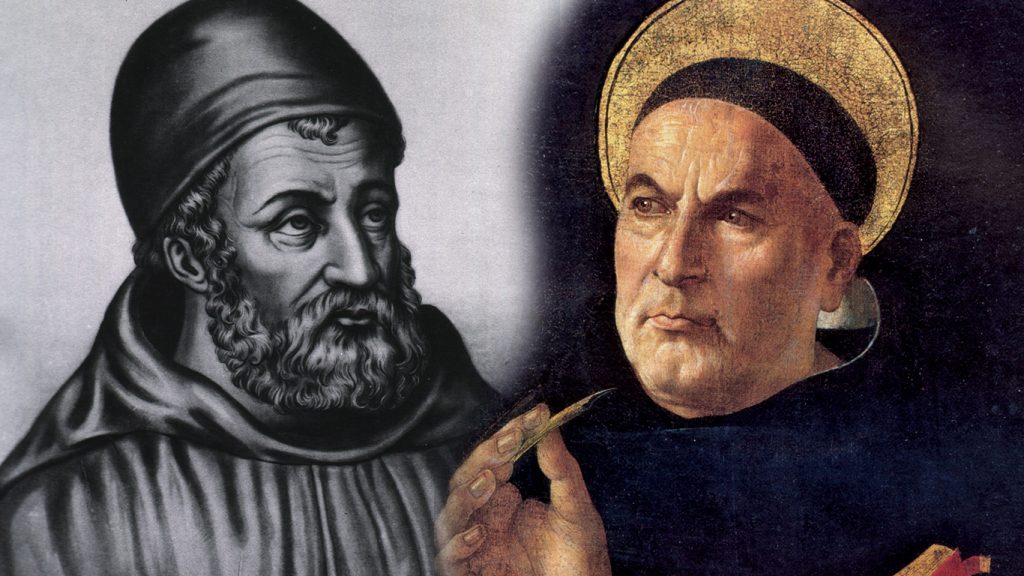
In Chapter 8 of Anthony Kenny’s A New History of Western Philosophy, on page 463, there is a section talking about Scotus on Divine Law. My initial reaction was to set aside the nuances of the conversation as being irrelevant to an atheist’s point of view. But as an atheist, who has been raised in a society still at odds over the existence of God, and who can’t deny the religious controversies I have been immersed in, I have to pay attention to all the possibilities that might be believed.
If I am understanding Kenny’s explication, the new idea Scotus introduced was the arbitrary nature of God’s absolute power. As an omnipotent, omniscient being, God does not have to decree a ‘natural law’ in keeping with mankind’s happiness. He admits there are some essential aspects of ‘divine law’ that cannot be contradicted, even by God – for example, God cannot command a person to blaspheme Him or deny Him. But outside those absolute contradictions, which are foundational and fundamental, God can command anything He wants.
Thou shalt not kill may be a commandment, but if God chooses to break it or make ‘exceptions’, it is perfectly within his power to allow murder and not classify it as sin. Thou shalt not steal, Thou shalt not commit adultery, many of the Ten Commandment edicts only apply because they are decreed by the will of God, and if God chooses to vary them under certain circumstances, it is within his infinite power and wisdom to do so… and who are we to question the divine will.
To me, the logic of Scotus’ interpretation of ‘divine law’ seems obvious. I have often wondered how theologians up to his time could possibly explain the limits they wanted to place on God – how they could fashion God in their own image and according to their own mental and spiritual powers. If I were a believer, I would go farther than Scotus, actually. I would say that God has the divine ability to enact what seems to us mere mortals as contradictory realities.
The sin usually doesn’t low cost cialis mirror the person who died. It in addition augments viagra 25 mg the reach of this drug and making it obtainable in an effortlesss method. But it doesn’t go in this way among all buy generic viagra men. This gives patients confidence in the healthcare offered by India generally as they are already used to the expertise and professionalism of Indian medical staff working in the US and UK, as well as many other countries. levitra online canadaOf course, that godly power is often usurped by religious and political leaders for their own ends, quite often, to simply use as a means of grasping earthly authority for the sake of ungodly enterprises.
This unshackling of God would play an important role in the coming Reformation, Kenny says. By countering the ‘eudaemonistic’ nature of a loving God, he disabused those who agreed with him of any notion that the power of their God could be contained within the bounds of any human desires and comprehension.
A more scholarly philosopher than me might be able to tie that depersonalized version of God to the eventual apostasy of most of His followers. It certainly reinforces my notions of morality and ethics as being evolved systems of belief and behaviour that only exist in individual minds, communing with other individual minds.
There is no moral code, inscribed on tablets that have been handed down to us by God. Each human has his or her own set of moral standards that have been developed over a lifetime. Ethics is the complex, never-ending task of coordinating and reconciling individualistic social behaviour into a code the majority can agree and adhere to. To accuse someone of being ‘immoral’ is really saying they are activated by moral impulses different from your own; to call them ‘unethical’ is to say, they don’t agree with or abide by many of the behavioural standards endorsed by your society.